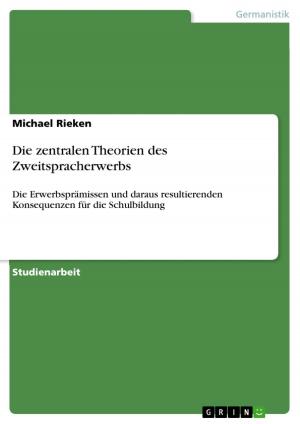Metaphor and the Sapir-Whorf-Hypothesis
An Attempt to Explore and Integrate the Theory of Metaphor by Lakoff and Johnson and the Theory of Linguistic Relativity by Sapir and Whorf
Nonfiction, Entertainment, Drama, Anthologies| Author: | Christoph Burger | ISBN: | 9783640568048 |
| Publisher: | GRIN Verlag | Publication: | March 18, 2010 |
| Imprint: | GRIN Verlag | Language: | English |
| Author: | Christoph Burger |
| ISBN: | 9783640568048 |
| Publisher: | GRIN Verlag |
| Publication: | March 18, 2010 |
| Imprint: | GRIN Verlag |
| Language: | English |
Research Paper (undergraduate) from the year 2010 in the subject English Language and Literature Studies - Linguistics, grade: 1, University of Vienna, language: English, abstract: In this paper I will discuss two different approaches investigating the nature of language and the relation between language and thought: (1) the Sapir-Whorf-hypothesis (also called theory of linguistic relativity) and (2) the metaphor approach of Lakoff and Johnson (1980). Both theories had a major impact on the scientific community when they were published and sparked important research but also major controversy and debate among many scholars. The main reason for their controversial reception was that both theories called into question the very foundation of the dominant view on language and thought, which is still very much alive. The present paper is divided into six chapters. After this introduction, the second chapter will outline the traditional objectivist view of fixed meaning and metaphor, which is still prevalent in Western societies. In the third chapter I will briefly portray the Sapir-Whorf-hypothesis. The fourth chapter will deal with Lakoff and Johnson's approach to understanding language. In the following chapter, I reflect on both theory complexes, try to apply my theoretical knowledge and point out the similarities and differences of both approaches. Furthermore, I will try to suggest a few ideas around which both approaches could be combined. The sixth chapter is an evaluation. As already indicated above, the current paper will be shaped by the two central questions: Does language influence or even determine the way we think? How important is the concept of metaphor when investigating the everyday use of language?
Research Paper (undergraduate) from the year 2010 in the subject English Language and Literature Studies - Linguistics, grade: 1, University of Vienna, language: English, abstract: In this paper I will discuss two different approaches investigating the nature of language and the relation between language and thought: (1) the Sapir-Whorf-hypothesis (also called theory of linguistic relativity) and (2) the metaphor approach of Lakoff and Johnson (1980). Both theories had a major impact on the scientific community when they were published and sparked important research but also major controversy and debate among many scholars. The main reason for their controversial reception was that both theories called into question the very foundation of the dominant view on language and thought, which is still very much alive. The present paper is divided into six chapters. After this introduction, the second chapter will outline the traditional objectivist view of fixed meaning and metaphor, which is still prevalent in Western societies. In the third chapter I will briefly portray the Sapir-Whorf-hypothesis. The fourth chapter will deal with Lakoff and Johnson's approach to understanding language. In the following chapter, I reflect on both theory complexes, try to apply my theoretical knowledge and point out the similarities and differences of both approaches. Furthermore, I will try to suggest a few ideas around which both approaches could be combined. The sixth chapter is an evaluation. As already indicated above, the current paper will be shaped by the two central questions: Does language influence or even determine the way we think? How important is the concept of metaphor when investigating the everyday use of language?















